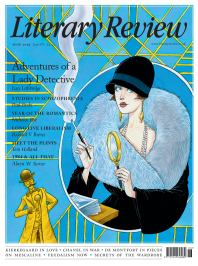Sam Kitchener
Gangster’s Paradise
Night Boat to Tangier
By Kevin Barry
Canongate 224pp £14.99
A work by an Irish writer in which two men wait for someone important who never turns up, passing the time in discussion of meals, aches and death, is hardly unfamiliar territory. The resemblance between Charlie Redmond and Maurice (‘Moss’) Hearne, the ‘mildly natty, mildly decrepit’ double act at the centre of Kevin Barry’s third novel (which began life as a play written for Dublin’s Abbey Theatre), and the tramps in Waiting for Godot even extends to the bowler hat perched on Moss’s head. Moss’s and Charlie’s back stories are given in more detail than those of their Beckettian counterparts, and are seedier. This ‘vaudeville pair’ are ageing gangsters from County Cork, though for all we know Estragon may also have slashed his own eye with a razor while suffering a drug-fuelled breakdown in the Spanish port of Algeciras, and who’s to say Vladimir didn’t have his knee ligaments sliced at a dockside dive bar?
We first meet Moss and Charlie sitting in the Algeciras ferry terminal in October 2018, getting drunk on Hennessy and cava, waiting for Moss’s missing daughter, Dilly, who they’ve been told is either leaving for Tangier or returning from there in a convoy of fellow hippies, or ‘crusties’. Through a series of flashbacks we learn that the Hearne and Redmond fortunes were made through a dope heist in Málaga back in 1994, to the chagrin of the local Costa del Sol cartels, who chased Moss, his wife, Cynthia, and an infant Dilly across Europe. We see Moss and Cynthia buy several properties through which to launder their ill-gotten gains, take lots of drugs, have lots of sex, fight and separate. Moss falls out with Charlie and returns to Spain, where he descends into violent depression.
The story is a rollicking one, more In Bruges than Samuel Beckett, and it is briskly told, in short paragraphs, with a dark wit and deftly managed suspense. Barry’s reputation is as a prose stylist with a taste for bravura conceits: his first novel, City of Bohane (2011), was a western set on the Irish coast in 2053; Beatlebone (2015) reimagined a real-life trip made by John Lennon to Ireland in 1967. Here, Barry’s lyrical phrase-making – through the window of a sanatorium, Moss sees the ‘first swallows of the year darting across the patch of sky outside, drawing out their fast invisible threads’ – gives the book an elegiac air that is deliberately at odds with the violence of the events described.
Other images and phrases are repeated: the bar Moss buys in the Gràcia district of Barcelona is ‘known for its anchovies’; the crowds in Málaga are described as a ‘swarm of fast anchovy faces’. Charlie and Moss could be any fading roisterers reflecting on past mistakes, savouring the details of even painful recollections, their addled memories reduced to a succession of recurring images. Good fun is had with their ragings against changing times: ‘Gràcia was not what it had been even five years previously. There was no longer good heroin. Now there were stores that sold specialist honey.’
The domestic travails and the soulfulness of gangsters, though, are familiar terrain, from the Kray brothers’ devotion to their mum to The Sopranos. The passages in which the two old thugs sit waxing sentimental, high on their own eloquence, are the least engaging in the book. Barry may give Dilly some tart observations on the rough underside of her father’s loquacious charm (‘watch for the glamorous sentence that appears from nowhere – it might have plans for you’), but the tenderness he shows for his criminal subjects, however finely done, in the end feels misplaced.

Sign Up to our newsletter
Receive free articles, highlights from the archive, news, details of prizes, and much more.@Lit_Review
Follow Literary Review on Twitter
Twitter Feed
Margaret Atwood has become a cultural weathervane, blamed for predicting dystopia and celebrated for resisting it. Yet her ‘memoir of sorts’ reveals a more complicated, playful figure.
@sophieolive introduces us to a young Peggy.
Sophie Oliver - Ms Fixit’s Characteristics
Sophie Oliver: Ms Fixit’s Characteristics - Book of Lives: A Memoir of Sorts by Margaret Atwood
literaryreview.co.uk
For a writer so ubiquitous, George Orwell remains curiously elusive. His voice is lost, his image scarce; all that survives is the prose, and the interpretations built upon it.
@Dorianlynskey wonders what is to be done.
Dorian Lynskey - Doublethink & Doubt
Dorian Lynskey: Doublethink & Doubt - Orwell: 2+2=5 by Raoul Peck (dir); George Orwell: Life and Legacy by Robert Colls
literaryreview.co.uk
The court of Henry VIII is easy to envision thanks to Hans Holbein the Younger’s portraits: the bearded king, Anne of Cleves in red and gold, Thomas Cromwell demure in black.
Peter Marshall paints a picture of the artist himself.
Peter Marshall - Varnish & Virtue
Peter Marshall: Varnish & Virtue - Holbein: Renaissance Master by Elizabeth Goldring
literaryreview.co.uk